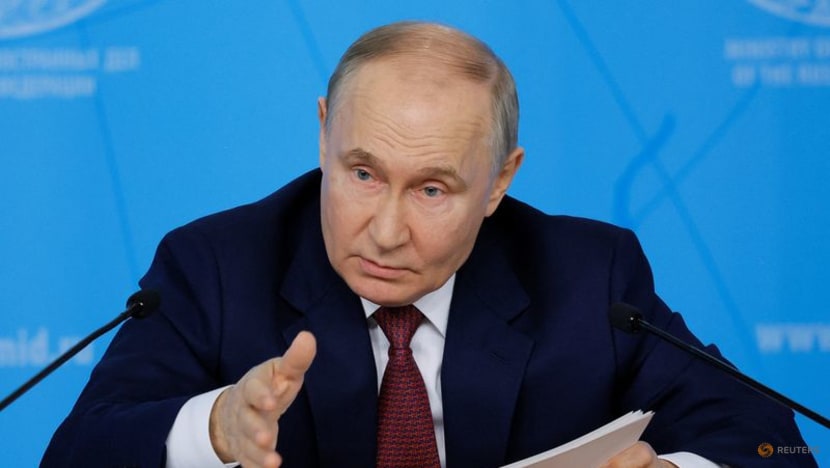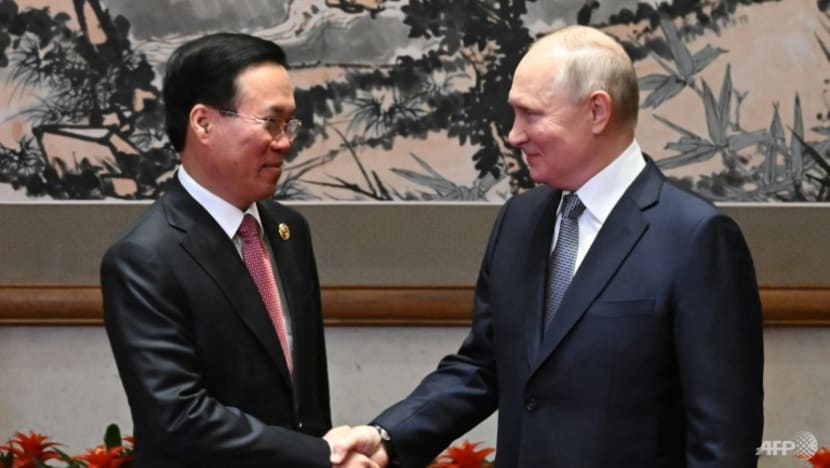
Russian President Vladimir Putin is set to visit Vietnam on Wednesday (Jun 19) for the first time in more than a decade, where he is expected to seek support as Moscow faces international isolation over its invasion of Ukraine.
His two-day state visit will cast a spotlight on Russia’s influence in Southeast Asia, where Hanoi remains one of Moscow’s few friends.
Putin is expected to push for closer ties with Vietnam through cooperation in defence, energy, trade and currency transactions, building on longstanding bilateral relations.
“(Putin’s visit) comes shortly after the Ukraine peace summit in Switzerland, to which Russia was not invited,” said Ian Storey, senior fellow from the ISEAS – Yusof Ishak Institute.
“So Putin wants to demonstrate to the world that efforts by the West to isolate Russia have failed in his view, and that Russia still has friends around the world, including in Asia.”
The visit also comes straight after Putin landed in Pyongyang in the early hours of Wednesday for his first visit to North Korea in 24 years.
There, he vowed to deepen trade and security ties with the reclusive nuclear-armed state and to support it against the United States.
US ISSUES REBUKE
Vietnam is rolling out the red carpet for Putin amid rebuke from the US government, despite having just upgraded relations with Washington last year.
In a statement sent to CNA, a spokesperson for the US Embassy in Hanoi said that no country “should give Putin a platform to promote his war of aggression and otherwise allow him to normalise his atrocities”.
“If he is able to travel freely, it could normalise Russia’s blatant violations of international law and inadvertently send the message that atrocities can be committed in Ukraine and elsewhere with impunity, worsening human suffering, and prolonging the path to sustainable peace and justice,” the spokesperson added.
“We cannot return to business as usual or turn a blind eye to the clear violations of international law Russia has committed in Ukraine. There needs to be accountability for those responsible for war crimes.”
HISTORICALLY DEEP RELATIONS WITH RUSSIA
Vietnam has continued its historically deep relations with the former Soviet Union, even as it aligns itself with the US in opposition to China.
Assistance from Russia played a critical role in Vietnam’s history of war and nation-building when peace resumed.
The US had entered Vietnam in the late 1950s to prevent a communist takeover of the region. As Vietnamese civilians became increasingly caught in the crossfire and American tactics grew more brutal, the war became deeply unpopular in the US.
Exhibits at the Vietnam Military History Museum, located in the heart of Hanoi, make it apparent Vietnam sees Russia as an ally.
Wreckage of American airplanes from the Vietnam War is placed next to Soviet-made missile systems and aircraft that Vietnam used during the war.
Nguyen Dat Phat, vice-chairman of the Vietnam-Russia Friendship Association, told CNA: “The support from the Soviet Union was great and important because then, we wanted to liberate the South and unite the country by force, by resistance war.
“We needed weapons, ammunition, gas, and so on.”
Now, Vietnam wants to show its support for Russia as well.
It avoided the Ukraine peace summit last weekend and has abstained from voting on United Nations resolutions on the Russia-Ukraine war.
“The draft resolutions are sponsored by the West to condemn Russia. I think abstention means not joining efforts to oppose Russia. That’s support for Russia,” said Nguyen.
POTENTIAL MAJOR DEFENCE AGREEMENTS
During Putin’s visit, talks are expected to focus on security and defence as well as boosting cooperation in energy and trade.
Leaders are also likely to discuss ways to get around international sanctions on Russia, including working out currency transactions in the banking system to enable payment for business.
Russia is the main provider of big-ticket defence equipment for Vietnam to protect its sovereignty in the South China Sea.
Russia was also the largest supplier of arms to Southeast Asia for two decades, before the value of Russian defence sales dropped due to greater competition from other countries and the threat of US sanctions, according to a 2021 analysis by Storey, the ISEAS – Yusof Ishak Institute expert on defence and security issues in Southeast Asia.
During his visit, Putin is expected to ask for support from Hanoi as well.
“Russia has asked all the countries that it has provided arms to, to help it to transfer munitions – in particular, which the Russian Armed Forces are short of,” Storey noted.
“North Korea, as we know, has done so. They have sent millions of rounds of ammunition to Russia. Vietnam so far has not.
“I think the Vietnamese leadership will be very reluctant to do so because they don’t want to take any steps that can be seen as prolonging the conflict,” he added.

Storey said that it is worth looking out for whether any major agreements will be signed on defence cooperation, especially on the sale of firearms.
While Vietnam has diversified its arms procurement since the mid-2010s, it still depends on Russia for supplies of spare parts, munitions and upgrades, he said.
Unprecedented waves of sanctions on Moscow imposed by the West over the war in Ukraine has greatly diminished Russia’s reliability as a defence supplier.
Despite this, Storey said Vietnam’s reliance on Russia looks set to “continue for many years to come”.
He added: “The question will be: If any new defence agreement is signed, will it just cover existing equipment? Or will Vietnam purchase new equipment from Russia?
“If it does, this will not go down too well in Washington because Washington has called on countries that buy arms from Russia to stop doing so, or possibly – if they do – face sanctions.”
Leaders from both sides are also expected to discuss Vietnam’s future membership in the BRICS group of major emerging economies, which was established in 2009 by Brazil, Russia, India, China and South Africa.
BRICS members want to build an alternative to the US dollar and give emerging economies more influence in international politics.
Earlier this year, the group added four members: Egypt, Ethiopia, Iran and the United Arab Emirates.
In Southeast Asia, Thailand and Malaysia are also working towards BRICS membership.
CNA

